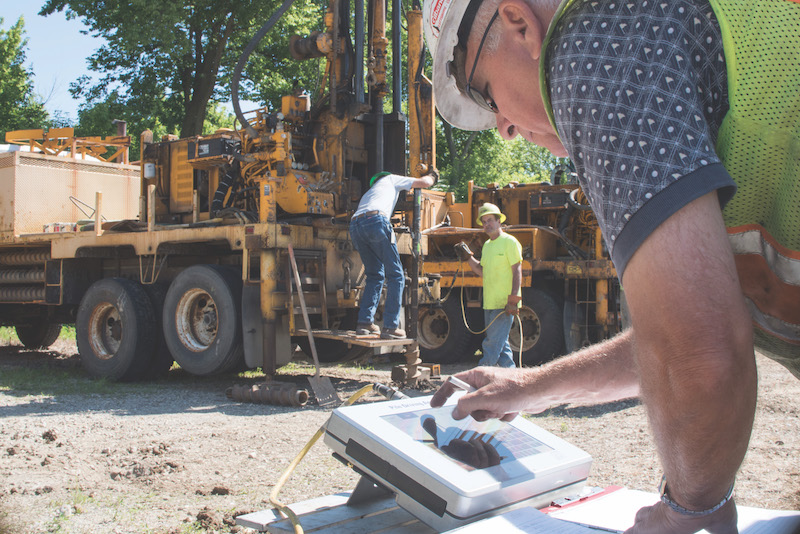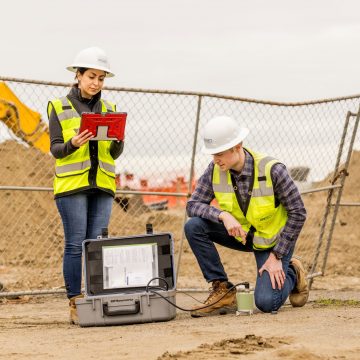The Evolution of Civil Consulting Engineers in the Modern Times
The Evolution of Civil Consulting Engineers in the Modern Times
Blog Article
A Thorough Review of the Secret Responsibilities of Geotechnical Engineers in Website Characterization and Ground Renovation Strategies for Design Solutions
Geotechnical engineers are indispensable to the successful execution of engineering projects, tasked with the important obligations of website characterization and the application of ground improvement techniques. Their work involves a complete analysis of subsurface conditions, employing different screening methods to identify dirt and rock residential properties.
Function of Geotechnical Engineers
Geotechnical engineers play a crucial function in the layout and building and construction of infrastructure by assessing the actions of dirt and rock below the surface - geo tech engineering. Their responsibilities encompass evaluating subsurface conditions to inform layout decisions that make certain architectural stability and security. By conducting comprehensive analyses of dirt homes, consisting of shear stamina, compressibility, and permeability, geotechnical designers supply crucial information that influences the option of appropriate construction products and strategies
Along with evaluating soil mechanics, geotechnical designers are charged with determining prospective hazards such as landslides, sinkholes, and ground negotiations. Their competence helps alleviate threats connected with these geotechnical sensations, thus shielding both the environment and public safety and security. They additionally team up carefully with other design disciplines, making sure that geotechnical considerations are incorporated into overall project style.
In addition, geotechnical engineers engage in the evaluation of existing structures, giving referrals for retrofitting and fixings when needed. Their thorough understanding of soil-structure interaction is crucial for the growth of lasting framework services. Generally, the function of geotechnical engineers is essential to the successful awareness of building projects, guaranteeing they are risk-free, resilient, and certified with governing criteria.

Website Characterization Processes
Reliable site characterization procedures are crucial for comprehending the subsurface conditions that affect project layout and execution. Geotechnical engineers utilize an organized method to gather, review, and translate information relating to rock, soil, and groundwater attributes. This procedure starts with a complete evaluation of existing literary works and archaeological site information, supplying understandings right into previous website problems and possible challenges.

Information evaluation complies with fieldwork, where engineers use geostatistical approaches to interpret searchings for and create geological versions. Through diligent site characterization, geotechnical designers lay the groundwork for effective task execution, enhancing and lessening unexpected issues source allowance.
Dirt and Rock Screening Approaches
While comprehending subsurface problems is vital, the choice of ideal soil and rock testing approaches is just as essential for accurate evaluation and layout. Geotechnical designers utilize a selection of screening strategies to assess the physical and mechanical residential properties of dirt and rock products.
Lab examinations, such as Atterberg restrictions, grain dimension evaluation, and unconfined compressive strength examinations, give vital data on soil actions under different dampness conditions and filling circumstances. These tests assist identify dirt category and forecast settlement or shear strength qualities essential for structure style.
In-situ testing techniques, including Requirement Penetration Examinations (SPT), Cone Infiltration Tests (CPT), and stress meter tests, enable engineers to gather information directly from the ground. These techniques supply useful insights into the soil's thickness, consistency, and stratification without the demand for extensive tasting.
Rock screening typically entails core sampling and research laboratory analysis to examine residential or commercial properties like uniaxial compressive strength discover this and rock quality designation (RQD) Together, these dirt and rock screening methods make it possible for geotechnical designers to make educated decisions regarding site-specific challenges, making certain the safety and security and stability of engineering options.
Ground Enhancement Techniques
Ground renovation techniques are vital for improving the design homes of dirt, thereby increasing its load-bearing capacity and decreasing negotiation. These techniques are critical in dealing with obstacles offered by weak or problematic dirts, which can dramatically affect the stability and sturdiness of structures.
Different ground improvement strategies are used, consisting of compaction, grouting, and dirt stabilization. Compaction includes enhancing the density of soil via mechanical means, which enhances its shear strength and reduces compressibility. Grouting, on the various other hand, includes injecting a fluid material right into the ground to load voids and boost soil cohesion. This method is particularly effective for dealing with loosened sands or fractured rock.
Soil stablizing incorporates a series of techniques, from chemical additives to mechanical treatments, focused on improving the click over here soil's resistance to erosion and deformation. Techniques such as lime stablizing or concrete mixing alter the homes of the soil at a bit level, boosting its total efficiency.
Importance of Geotechnical Assessments
Geotechnical evaluations play a critical function in the planning and style of engineering projects, as they offer necessary information concerning the subsurface problems. Comprehending soil properties, rock formations, groundwater degrees, and possible geohazards is crucial for making certain the security and safety and security of structures. These analyses enable designers to make enlightened decisions pertaining to website selection, layout parameters, and building methodologies.
The value of geotechnical assessments expands past first job phases; they contribute in risk monitoring and price efficiency. By determining potential problems early, such as dirt settlement, incline instability, or excessive groundwater, designers can design proper mitigation approaches, minimizing the possibility of architectural failures and pricey hold-ups. In addition, these evaluations support conformity with regulatory demands and improve the sustainability of engineering methods.

Verdict
To conclude, geotechnical designers are important to guaranteeing the safety and security and stability of engineering tasks via extensive website characterization and ground renovation methods. geotechnical industry. Their methodical method to analyzing subsurface problems, combined with their recommendations for reliable ground adjustment, significantly boosts soil residential or commercial properties and load-bearing capacity. The experience of blog here geotechnical engineers not just facilitates educated project preparation but additionally makes sure conformity with policies and cultivates efficient communication among stakeholders, inevitably adding to successful engineering end results
Geotechnical designers play an essential duty in the design and building of framework by evaluating the habits of soil and rock below the surface area. By carrying out in-depth evaluations of soil homes, consisting of shear leaks in the structure, stamina, and compressibility, geotechnical engineers provide important information that influences the option of proper building materials and strategies.
In addition to examining dirt auto mechanics, geotechnical engineers are charged with identifying potential hazards such as landslides, sinkholes, and ground settlements. Geotechnical designers use an organized technique to gather, assess, and interpret information pertaining to soil, rock, and groundwater characteristics. By identifying prospective problems early, such as soil negotiation, slope instability, or extreme groundwater, engineers can develop ideal mitigation approaches, decreasing the chance of structural failures and expensive hold-ups.
Report this page